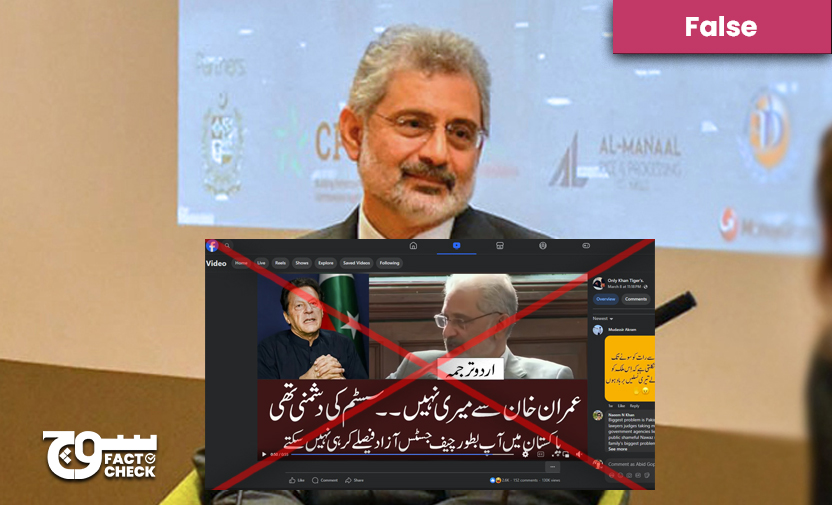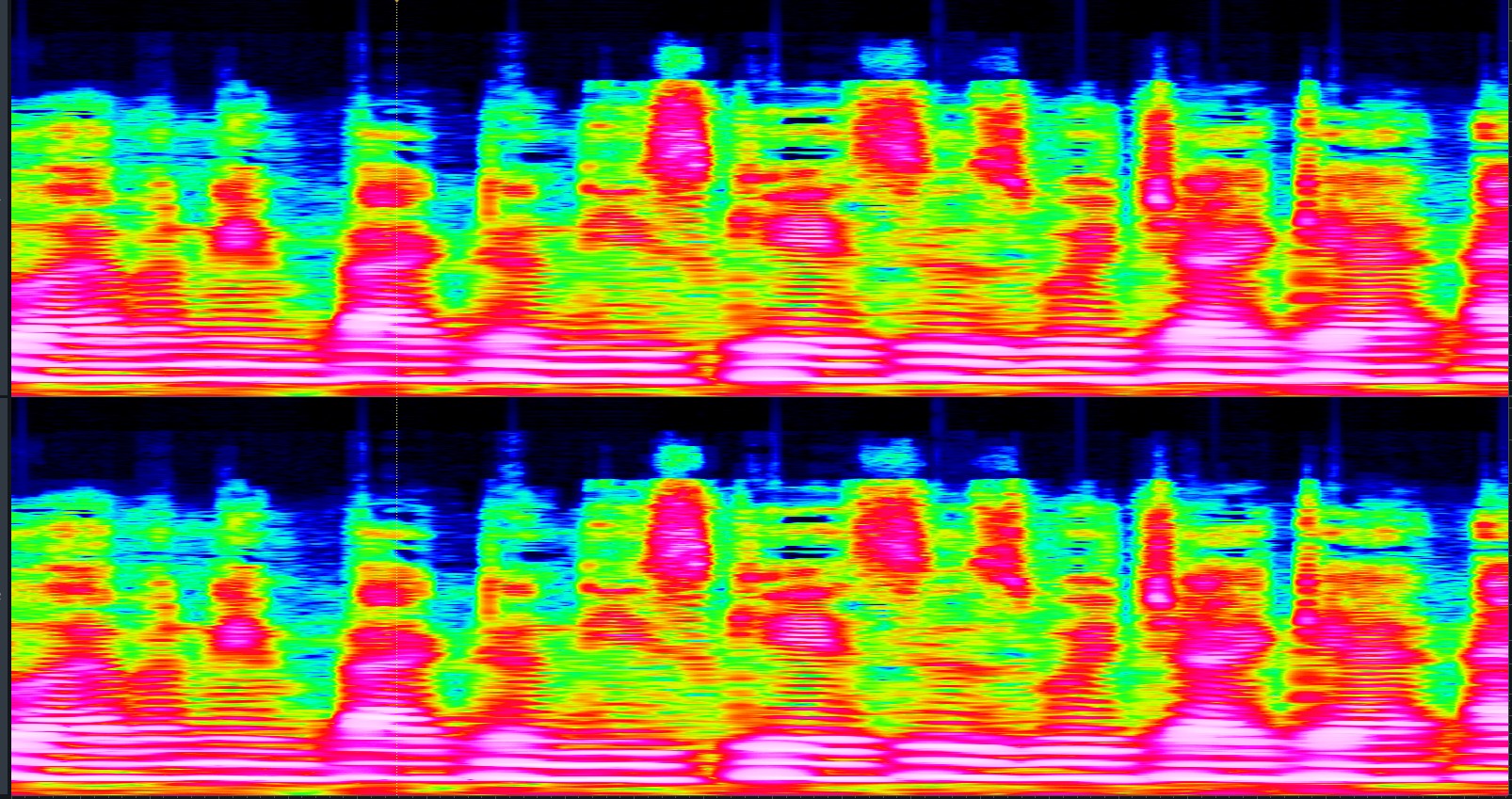
Claim: During a recent interview, former Chief Justice Qazi Faez Isa claimed that hidden powers influenced anti-PTI verdicts and his role was limited.
Fact: The claim is false as the audio in the video is doctored. The actual interview dates back to October 2022, before Qazi Faez Isa became Chief Justice, and he did not discuss Imran Khan, the cases against him or any hidden powers influencing the judiciary.
Social media users have widely shared a video (archive) of the former Chief Justice of Pakistan during an interview, which features the following Urdu text, “عمران خان سے میری نہیں ۔۔ سسٹم کی دشمنی تھی
پاکستان میں آپ بطور چیف جسٹس آزاد فیصلے کر ہی نہیں سکتے”
[Translation: My enmity was not with Imran Khan… it was with the system.
In Pakistan, you cannot make independent decisions as Chief Justice.]
In the video, the interviewer supposedly asked the former CJP, “Do you have any personal fight with Imran Khan? I mean looking at all the PTI cases that came before you it seemed that you are not in the mood to do justice?”
He responded, “Look Pakistan’s system is a bit complicated. If you think that as a chief justice I had all the powers, then you are wrong.” He further stated, “My role in all the cases you are talking about was limited. Yes, some powers that are not visible in the media also have an impact in these cases which I can- I cannot name here.”
Qazi Faez Isa
Qazi Faez Isa was sworn in as the 29th Chief Justice of Pakistan in September 2023, and his tenure lasted till 25 October 2024. Some of his decisions during this time provoked criticism from the PTI. For instance, in January 2024, the Supreme Court (SC) annulled the Peshawar High Court’s order to reinstate Pakistan Tehreek-e-Insaf’s ‘bat’ symbol and deprived the party of its electoral symbol for the General Elections 2024. The judgement upheld the Election Commission of Pakistan’s decision to revoke the symbol, citing PTI’s failure to produce sufficient evidence that intra-party elections were held, according to Dawn’s report, which quoted from the SC judgement. “According to the court, the ECP did not act in a mala fide manner nor was the PTI discriminated against in the present case,” the report added. The decision drew criticism from many among the community of lawyers, and non-PTI supporters as well.
During a Supreme Court hearing on the formation of election tribunals in July 2024, tensions rose between the former Chief Justice and PTI lawyer Niazullah Niazi who objected to his inclusion in the bench. The former CJP swiftly dismissed and criticised Niazi’s actions as contempt of the judiciary. A report by The Express Tribune further elaborated that the incident was part of ongoing tensions between the judiciary and PTI lawyers, with previous hearings witnessing similar clashes.
According to another report by The Express Tribune, in September 2024, Imran Khan accused Qazi Faez Isa of having a political agenda. He also claimed that PTI’s legal petitions were ignored by the former CJP.
Fact or Fiction?
The claim seemed suspicious because had the former CJP made such a polarising statement, it would spark a widespread reaction among the public and receive heavy coverage within the mainstream media. However, we found no credible news reports on the matter.
Additionally, a major visual discrepancy in the video was that the audio did not align with the former Chief Justice’s lip movements. The audio also continued even when his lips were not moving, suggesting dubbing over the original footage.
A reverse image search of keyframes from the video led us to its original version, shared by the Oxford Union on YouTube on 9 October 2022. The video titled “Justice Qazi Faez Isa: Pakistani Supreme Court Justice | Full Q&A at The Oxford Union” featured Isa addressing the Oxford Union followed by a question-and-answer session. Given that he was sworn in as Chief Justice in September 2023, it is unlikely that he would have commented on decisions or cases during his tenure at the time of the 2022 interview.
Nevertheless, we reviewed the entire video to verify if he had commented on or hinted at the idea of any external interference or influences within Pakistan’s judiciary at all. We found that Justice Isa discussed various topics, including his family heritage, the importance of education, the Supreme Court’s role, fundamental rights, freedom of speech, judicial activism, secularism, environmental issues, and social justice. He emphasised the judiciary’s responsibility to uphold constitutional rights, address legal challenges, and ensure justice for marginalised groups. He also spoke about press freedom, secularism within an Islamic Republic, and the challenges in implementing court decisions. Throughout the session, there was no mention of hidden powers influencing judicial decisions.
This points to the audio being dubbed, which was corroborated by Shaur Azher, an audio engineer at our sister company Soch Videos, who analysed the viral video and found that its frequencies remained constant from 20 hertz (Hz) to 13,000 Hz before fading between 13,500 Hz and 16,000 Hz, with higher frequencies missing beyond 16,500 Hz – a sign of potential tampering. He explained that such anomalies often occur when audio is edited or artificially generated, resulting in unnatural frequency patterns.

Azher concluded that “the viral video appeared to be a doctored version of Justice Isa’s Oxford Union address, with AI-generated audio altering his original statements.”
We also analysed the audio through DeepFake-O-Meter, developed by the University at Buffalo’s Media Forensics Lab (UB MDFL). From the available detectors, we used three, namely AASIST, LFCC-LCNN, and RawNet3. They revealed that the probability of the audio in question being AI-generated was 99.7%, 100.0%, and 100.0%, respectively. The results are available here, here, and here; however, only those who have signed up can view them.
Finally, we analysed the audio using Resemble Detect, a tool designed for real-time detection of deepfake audio across various media types, which rated the audio as “fake.”
The tool’s results are based on specific markers that distinguish synthetic sounds from natural human speech. These include audio artifacts, such as subtle distortions or patterns not found in natural recordings, and unnatural speech patterns, such as consistent pacing, pitch, or tone, or the lack of natural variability heard in human speech. Additionally, some AI-generated clips lack background noise or inconsistencies typically present in live recordings, which is a general characteristic detected by the tool.
Since Resemble Detect uses advanced tools to analyse the sound’s patterns and identify anything unusual, the analysis lent more credibility to our suspicion that the audio of the Justice Isa is artificial.
Based on our review of the original video, Azher’s audio forensic analysis, and the results from AI detection tools, Soch Fact Check concludes that the audio is AI-generated.
Virality
The claim was shared here, here, here, here, here, and here on Facebook. Archived here, here, here, here, here, and here.
On X, it was shared here, here, here, here, and here. Archived here, here, here, here, and here.
It was also shared here (archive) on Threads.
On Instagram, it was shared here.
Conclusion: A video of former Chief Justice Qazi Faez Isa blaming hidden powers for anti-PTI verdicts is doctored; our own sound analysis along with results from multiple independent forensic tools confirmed the audio in the claim is artificially generated.
Additionally, a review of the original video showed that Justice Isa never discussed Imran Khan or the cases against him during the interview. He did not comment on any hidden powers influencing the judiciary either.
–
Background image in cover photo: GeoTv
To appeal against our fact-check, please send an email to appeals@sochfactcheck.com
